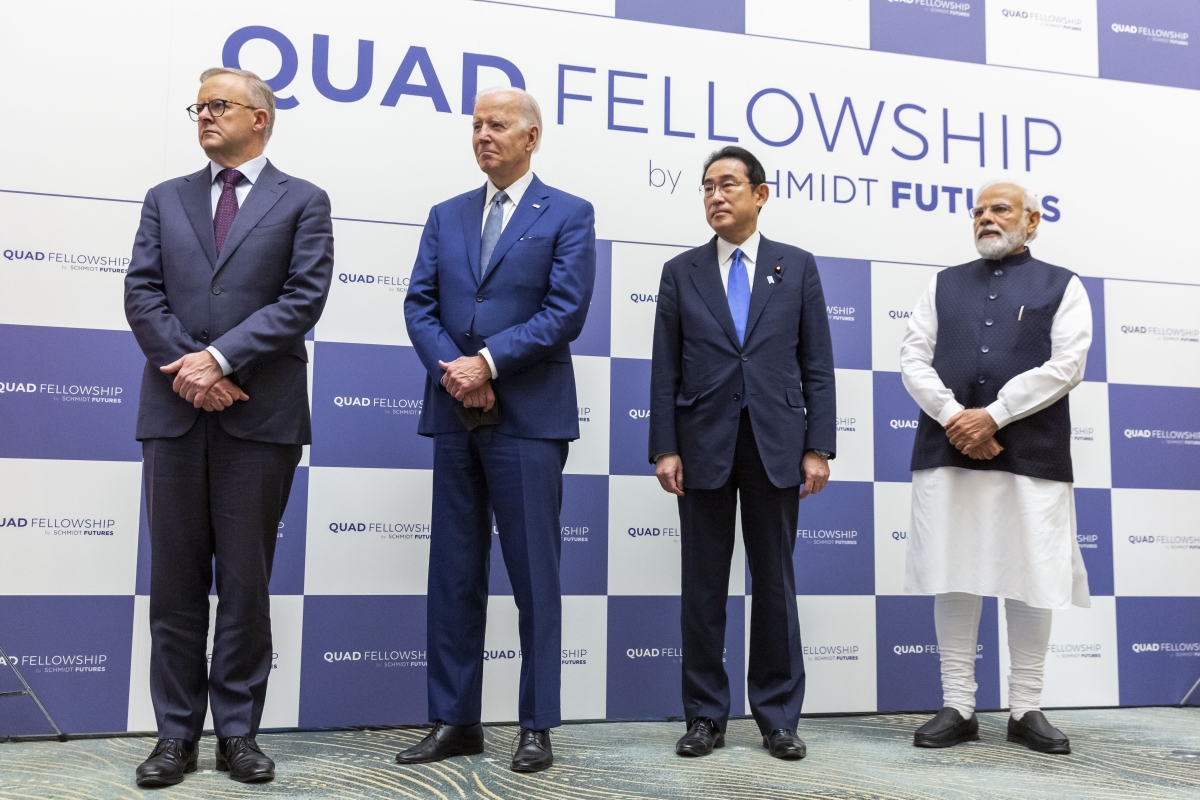ASPI Note: The Tokyo Quad

What happened?
President Biden attended the fourth Quad Summit meeting in Tokyo on May 23; an in-person meeting hosted by Japanese Prime Minister Kishida with Prime Minister Modi of India and the newly minted Australian Prime Minister Albanese.
The Quad meeting produced a major new initiative to improve maritime domain awareness among countries in the Indo-Pacific, expanded its existing vaccine partnership, announced ministerial meetings on transportation and clean energy, and launched high-level coordination on infrastructure finance.
The background:
The Biden administration rebooted the Quadrilateral Security Dialogue, elevated it to leader-level, and turned the Quad into an action-oriented platform for the four major democracies to jointly produce common public goods for the Indo-Pacific region.
- Quad 2.0 is wider in scope and includes initiatives on vaccine distribution, emerging technologies, climate resilience, and cybersecurity.
- The Quad now confers on major global developments, such as Russia’s invasion of Ukraine, and regularly issues policy-rich joint statements setting our common positions.
- While there is no secretariat, Japan assumed chairmanship of the Quad in 2022, and a series of working groups bringing together subject-matter experts to coordinate and develop initiatives were established.
Why it matters?
- Quad members deliberately do not frame it as an anti-China grouping, although Beijing attacks it as such. And by not calling out China directly or engaging on hard security issues, they have bolstered the comfort level of “fence-sitting” nations in Asia who worry about the risk of a Cold (or hot) War. This approach also undermines Beijing’s accusation that the Quad is an “Asian NATO.”
- The announced Maritime Domain Awareness Partnership is a potential game-changer. Most countries in the region have vast coastlines, and some have millions of square miles of open ocean in their exclusive economic zones (EEZ) with trillions of dollars worth of undersea resources. This new partnership would provide them with the ability to monitor and protect their interests.
Coming on the heels of the U.S.-ASEAN leaders meeting in Washington earlier in the month and the rollout of the 13-member Indo-Pacific Economic Framework (IPEF) the previous day, the Quad Summit further reinforced progress in the Biden administration’s declared intention of strengthening existing partnerships and creating new ones.
Key takeaways:
- The Quad 2.0 harnesses New Delhi’s anger at China following deadly border clashes and signals a steady Indian trend toward alignment with the West after decades of non-aligned doctrine. A western-aligned India is a far more formidable rival to China.
- Like the earlier Quad Vaccine Initiative, the Maritime Domain Awareness Partnership harnesses western technology in a way that directly benefits smaller countries and positions them to better safeguard their own interests.
- The Quad 2.0 is proving to be a clever and effective way to back-foot Beijing by outperforming China in providing global public goods and showing that “democracies deliver.”
- Thus far, the Chinese have been flummoxed. Chinese President Xi Jinping’s government has alternately railed against the Quad, pledged to expand the BRICS as a counterweight (despite India’s membership and China’s rejection of ‘blocs’), and announced vague initiatives such as the “Global Security Initiative.”
What to watch for:
The Quad 2.0 has been remarkably productive in generating working groups and initiatives. But it’s first big project, a pledge to donate 1.3 billion doses of the Covid-19 vaccine, was dealt a setback when India’s manufacturing capacity was redirected to domestic priorities and exports were banned. Working groups on areas of interest to developing countries are meeting behind closed doors. More than a year after its reboot at the first virtual summit, the Quad 2.0 now has to deliver results, certainly by the time of the next in-person summit in Australia.
Go Deeper:
https://asiasociety.org/northern-california/seeking-truth-through-facts…;
https://asiasociety.org/policy-institute/aspi-note-how-understand-quad-…;
https://asiasociety.org/video/quad-2022-dialogue-and-disruption
